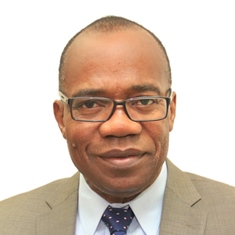Dr. Okwu Joseph Nnanna

Okwu Joseph Nnanna is an economist and a central banker. He has three decades of post qualification professional experience. He attended William Paterson University in Wayne, New Jersey and University of Houston, in Houston Texas, USA from 1975-80, where he read Finance, Public Policy and Economics. He graduated with B.A, M.A and PhD diplomas. Since graduation,Okwu Joseph Nnanna has attended several economic policy oriented training programs. In 2003 and 2004, he studied at Harvard University and participated in the macroeconomic policy and leadership/ organizational management training programs. In 2006, he attended the Bundesbank intensive training program on how to: �Conduct Monetary Policy in a Monetary Zone�.
Dr. Nnanna was appointed Deputy Governor (Financial System Stability) Central Bank of Nigeria on February 3, 2015. His work experience includes: a brief period of teaching at the University of Houston at Clear Lake City campus (USA) and at the federal government Polytechnic, Akure (Nigeria) in 1980-82. And from 1982-1989, he worked as a staff economist in the international trade and exchange rate section of the Research Department of the Central Bank of Nigeria.
His international work experience started with his engagement by the International Monetary Fund (IMF) from 1989-94. During this period he worked as a staff economist and desk officer in the African Department of the IMF and participated in multilateral surveillance missions to several African countries including: Kenya, South Africa, Lesotho, Sychelles , etc, and assisted the authorities in their economic policy making process and in the implementation of their structural adjustment programs.
Dr. Nnanna rejoined the Central Bank of Nigeria in 1994 and was appointed as an Advisor to the Governor of the Central Bank. And in 2001 was appointed the Director of Research and Statistics of the Central Bank of Nigeria. At the Central Bank, he actively participated in the policy formulation process which culminated into the liberalization and deregulation of Nigeria�s financial system in particular and the real productive sectors of the economy as a whole.
Dr. Nnanna was appointed the Director-General of the West African Monetary Institute in 2006-2008. The Institute is the agency responsible for the actualization of the proposed second West African monetary union. As prelude to the introduction of the West African common currency, he convinced the authorities of the member states of the West African Monetary Zone to use their local currencies in intra-regional trade in order to conserve their scarce foreign exchange reserves and minimize exchange rate risks.
Dr. Nnanna also served as full time consultant to the government of Nigeria as a technical assistant to the National Economic Management Team and the Presidential Steering Committee on Global economic crisis. He was also a part-time consultant to the United Nations Conference on Trade and Development (UNCTAD).
In 2012-2014, Dr. Nnanna , served as the Alternate Executive Director, representing Nigeria and 21 other sub-sahara African countries on the Board of the International Monetary Fund (IMF), Washington D.C
He is an author/co-author of five books and over forty published articles. Dr. Nnanna has served on the boards of many organizations and belongs to several professional societies. A life member of the Nigeria Economic Society. He is a recipient of Dr. Nkwame Nkrumah Africa Leadership Award and also an avid tennis player.
